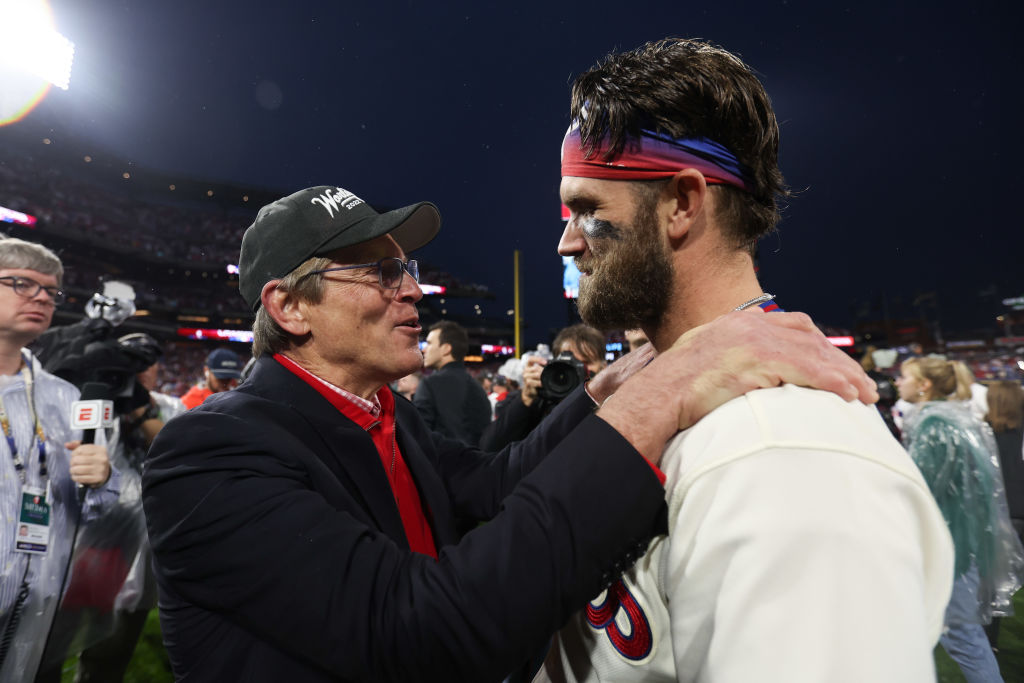By now, anyone who cares to know what John Middleton said has already praised him for it. And if you don't know what he said, or who he is for that matter, here's your post-facto primer: He is the owner of the Philadelphia Phillies, he has committed 43 years and $1 billion to his six most expensive players, and he's damned proud of it, to wit, this:
How much money did the '27 Yankees make? Or the '29 A's? Or the '75-76 Big Red Machine? Does anybody know? Does anybody care? Nobody knows or cares whether any of them made any money or not. If your ambition is to be good, you don't make those decisions. If your ambition is to be great, you make those decisions. It's about desire, really. I just want to win.
But that's what the market requires. People say, "Why are you doing that? That's just stupid." Well, I did it because that's what it took to sign the guy. If I had stopped it at seven or eight years, I wouldn't have signed them. So, that's your choice. And if you're overpaying 10 years from now for an athletes who got you a couple, three World Series titles, I mean, what do I care? Seriously. What do I care? And I can guarantee that none of our fans would care.
Philadelphia Inquirer
Well, yes. Of course that's the reason to buy a sports franchise in the first place, and the fact that you haven't heard an owner say it this way before now is a statement about why Defector's attitude towards ownership is that long sentences in poorly insulated Alaskan prisons is too good for most of them. Steve Cohen didn't say it when he was most recently pressed on the New York Mets' spending (he yammered on about being in compliance with ownership rules), and nobody else has ever used the "Who cares about our profit margin?" argument. This is a revelation worth repeating.
Middleton is owner-level rich (ninth in baseball, 30th in North American pro sports, if that helps), so just on the law of big numbers there is of course something dodgy in the retelling of his accumulated fortune, which in this case is tobacco, but you can't really be a billionaire without either burying your rich parents or standing on someone else's neck. But while most other owners buy teams because it's an avenue for notoriety as well as greater accumulated wealth, the ego stroke of buying a team fades fairly quickly. They learn quickly how to lay low and avoid the uncomfortable presser demanding explanations for bad behaviors. They just cash checks, go to owners' meetings to compare wallet thickness, and inquire about when the next set of checks are coming.
Middleton, though, is the first one to say that sports franchises are not principally about the care and comfort of the owner, and even if he doesn't actually believe it, he gets points for telling the comforting lie. Comforting, because it is true. Nobody you would ever want to drink with, speak to, sit near, or acknowledge in any way can tell you what the Phillies made last year, what they will spend this year, or how much more they will make this year. And yes, if this means the CFO of the Phillies must drink alone with nobody to grouse about work to, then he must drink alone and in silence. He knew the job was dangerous when he took it.
Besides, owning a team is implicitly a social contract with the people of that community. Sure it's a cash herd, a clumsy yet effective tax dodge, and a bulky tool of real-estate extortion, but for those who also want the love of regular citizens and their ATM cards, it is a compact of mutual interest: Entertain me and I will overpay for every moment; OK, but only if I get to set the rate of overpayment.
So Middleton's manifesto, as much as it might irk the cheapskate wing of the baseball establishment, is not only factually correct, emotionally satisfying, and beats the hell out of Cohen's trout-like I'm just spending the way the rules say I can, it puts a small dent in the dreadnought of ownership orthodoxy, to wit:
1. Have money, but want more.
2. Pay the barest lip service to the obligation of satisfying the customer, and when in doubt about a particular course of action, do less.
3. Try to win only when necessary, and only if it serves a greater future profit.
4. If at all possible, be an absentee owner. Invisible and absentee is even better.
There are others along the same vein, but you bovines can make up your own in the comments section. The point is, John Middleton just came up with the one rationale for his existence in the field that everyone can get behind and actually contribute to with a level of cheer. True, it's probably a myth, and in his quieter moments he is Scrooge McDuck diving into the Federal Reserve recumbent pool, but he said the words, which is more than his more desiccated colleagues ever bother to try. The only way he could have been forthright if he has finished the sentence, "Nobody knows or cares whether any of them made any money or not" with the phrase, Other than me, of course. I memorize every receipt like I'm Ken Jennings on crank.
As it is, you can just take what he did say and pretend it's true, and curse your own team's owner for not having the collapsible sliver of spine to say it him- or herself. Even if it's just a rhetorical scam, it shore sounds purdy.






